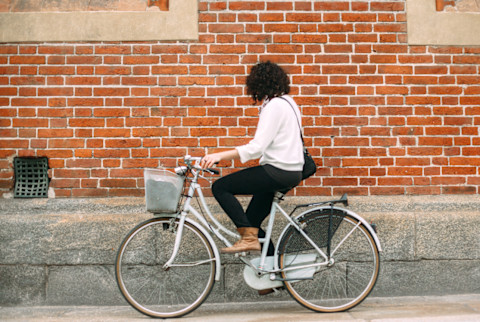
When I first moved to a city, it was difficult to keep up with some of the green habits I'd developed in the 'burbs. After all, it is easier to get outside and form a meaningful bond with nature when you're surrounded by greenery as opposed to concrete. The lifestyle change was drastic, but eventually I found ways to implement more environmentally friendly practices in my daily city routine. And I didn't have to overhaul my life in the process, either. Here's how:
1. Make your apartment as energy efficient as possible.
If you want to be more environmentally friendly, start at home. After all, that's where we typically spend more than a third of our lives—and it’s an area we have nearly complete control over.
If you're renting or living somewhere temporarily, making small tweaks like installing a smart thermostat that regulates the temperature of your home (whether you’re there or not) is a great way to be a little more energy efficient. Replacing incandescent light bulbs with LEDs and unplugging chargers/electronics when they aren’t in use can also add up to big resource savings and extra cash in your pocket. Energy Star predicts that the average U.S. household could save more than $100 a year by unplugging devices when they're turned off.
2. Commute smarter.
More and more cities around the United States are starting to offer bike share programs where users can check out a bike at one station and ride it to another one closer to where they’re going. Besides being eco-friendly, riding a bike is a great way to get in some exercise. You’ll also save money since you won’t have to worry about buying and maintaining your own bicycle.
If biking isn’t an option, make an effort to use your city’s public transit instead. Or if you need to drive your own car, try chaining trips together to reduce the amount you’re on the road (or stuck in city traffic).
3. Resist takeout.
You've probably heard it time and time again, but the amount of unnecessary trash you can save by carrying around reusable bottles and bags is astonishing. This rings especially true if you live in a city. Use a reusable container to store your lunch, and pick up a reusable mug to save coffee cups from getting tossed into the landfill. I've found that bringing my reusable mug to my neighborhood cafe is just as easy, plus it gives you an excuse to make friends with the baristas and get 50 cents off your coffee.
If you tend to go out for lunch with co-workers, even something as small as skipping the straw for your soft drink can do a lot for the environment. It’s estimated that 500 million straws are used in the United States every day, and many of them end up in landfills, waterways, or the ocean.
Stash a canvas bag in your purse or computer bag, too, so that if you have to run to the grocery store after work, you won’t need to use a plastic or paper one. A little planning ahead can go a long way when you’re trying to go green.
4. Grow a garden.
A garden can be anything from a few tomato plants to a variety of herbs, and you don’t even need a ton of space to start yours. Growing a few veggies or herbs gives you access to the freshest food available and helps you reduce waste because you won’t have to buy food wrapped in excessive packaging.
If you don’t have space for a personal patio or windowsill garden, many cities have community gardens. For a fee, you’ll get a small plot of land to grow whatever you’d like. It’s a wonderful way to spend some time outside and get to know some of your neighbors.
5. Investigate your local food scene.
If you can’t grow your own food, buying seasonally and locally is the next best thing. You’ll help the local economy, support farmers, and reduce your carbon footprint because your food will come from the next town over instead of halfway around the world. Check out a seasonal food guide to see what’s fresh near you, or join a local CSA and they'll do the choosing for you.
Many cities in the United States now host farmers year-round, or at least in the spring and summer months. Attending them is an easy and fun way to ensure that what you’re buying is truly local. Plus, it's a chance to connect with the farmers and like-minded people doing their best to live green.
